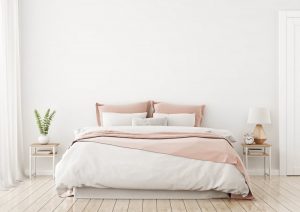Sleep Soundly: Creating the Perfect Sleep Environment & Bedtime Routine
March 14, 2018

According to the Centers for Disease Control and Prevention (CDC), one-third of adults in the United States get less than the recommended seven hours of sleep each night. And that’s despite the fact that it’s well-researched and widely accepted that adequate sleep is a major contributor to our overall health and well-being, physically and mentally.
Clearly, there are various factors that contribute to one’s sleep habits and ability to get sufficient sleep, but two key factors over which we have (almost) complete control are our sleep environment and bedtime routine. Even just a few tweaks to our bedroom and/or lifestyle habits can have a significant impact on our sleep quality.
Create the Ideal Sleep Environment
Noise
Reduce as much in-home and external noise as possible.
- Turn off the TV, radio, and other devices
- Put your phone on silent or vibrate
If there are outside noises over which you have little control, consider using a white noise machine or fan to help “drown out” the sudden or periodic noises that can pierce the silence and interrupt sleep.
Bedroom Temperature
The body is designed to sleep better at cooler temperatures; in fact, our body temperature naturally drops in the evening to prepare us for slumber.
For most people, the optimal temperature for sleeping is between 60-67 degrees. It may take a bit of experimentation to find your ideal sleeping temperature, so spend a few nights playing with the thermostat and/or the amount of blankets on your bed.
Also consider your sleepwear. Pajamas made of cotton are ideal as they are breathable and can help prevent overheating. Many people also like to sleep with as little clothing as possible, which has many potential benefits, including temperature regulation.
Light
Light stimulates alertness and affects your body’s sleep rhythms. All artificial light — especially the blue light emitted by digital devices such as TVs, computers, tablets, and phones — tricks the body into slowing its production of melatonin, the hormone that promotes sleep, which can make it more difficult to fall asleep.
Ways to reduce or eliminate light in the bedroom:
- Avoid using any electronic devices, including the TV, computer, e-reader, tablet, and phone at least one hour prior to bedtime
- Install heavy curtains or blackout blinds
- If you use an alarm clock, put them on the other side of the room and turn them away from you
- Consider using electrical tape to cover bright blue lights from electronics
Bedtime Routine
In addition to your sleep environment, a proper and consistent bedtime routine is extremely important as it triggers metabolic and mental responses that help the mind and body slow down. A few keys for a sleep-inducing bedtime routine include:
Dim the lights in the evening.
As discussed above, light stimulates the brain and encourages wakefulness. Get in the habit of dimming the lights to as low as possible in the evening hours.
Prepare for the next day.
Anxiety and stress are common sleep-inhibiting factors. One way to reduce them is to prepare for the next day before going to bed. Set out your clothes, make your lunch, and gather the items you’ll need to leave the house with.
Establish a relaxing wind down ritual.
Make a cup of caffeine-free tea. Take a relaxing bath or shower. Read a book. Listen to a podcast. Spend time meditating or stretching. Whatever activity you choose, make sure it’s relaxing and that you do it consistently each night.
Calculate bedtime and wake up hours and stick to it!
Don’t forget that you need at least seven full hours for a proper night’s rest, and your bedtime and waking hours should be consistent, regardless of the day of the week. Social jet lag (sleeping longer on the weekends to make up for lost sleep during the week) is extremely common, but can be detrimental to your natural circadian rhythm.
If, after implementing the strategies outlined above, you still struggle to get seven hours of sleep each night, or despite getting sufficient sleep, continue to wake up fatigued, you may be suffering from an underlying sleep condition that needs to be diagnosed and treated by a sleep specialist. Contact Dr. Kent Smith at Sleep Dallas to learn more.
